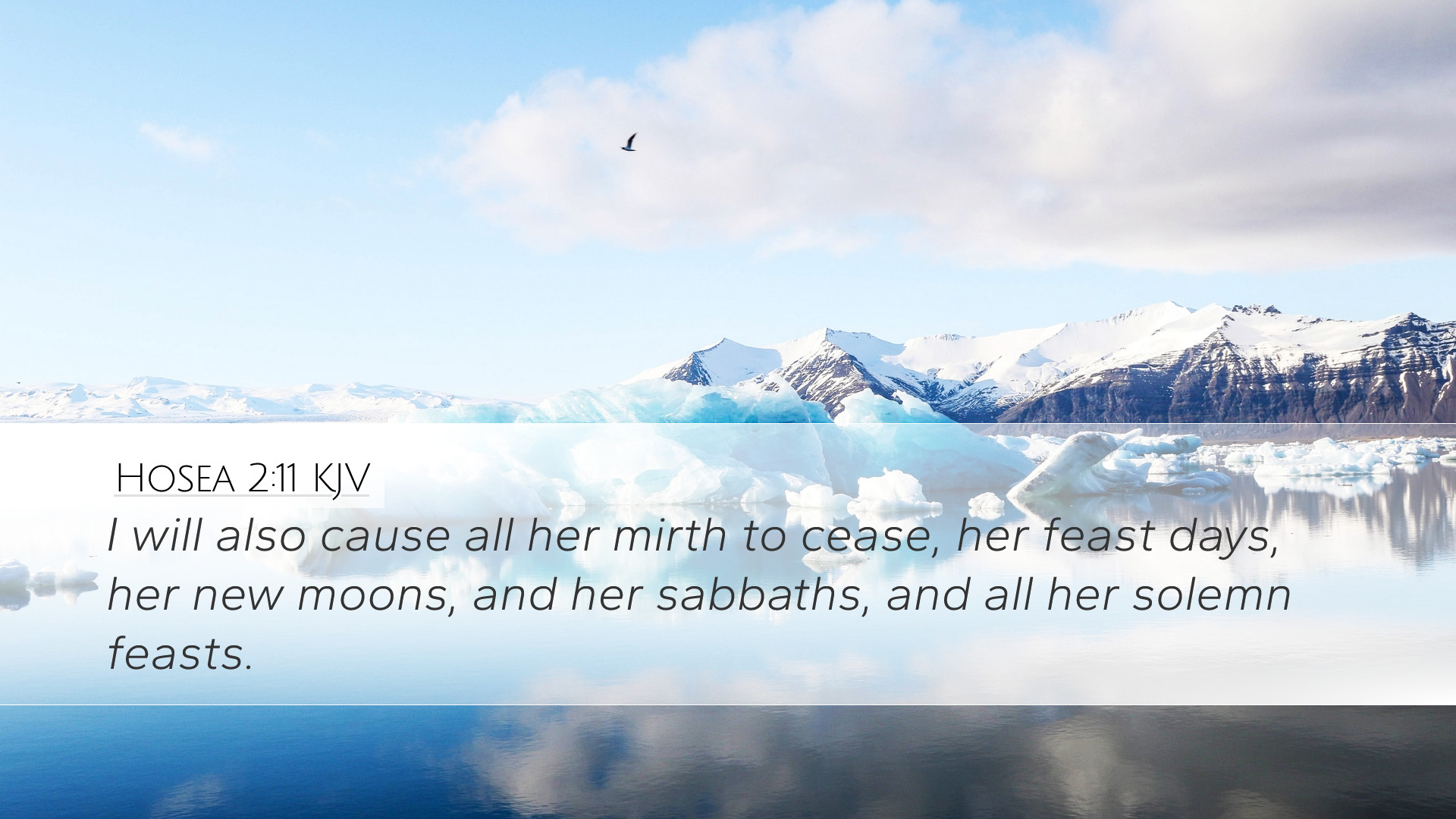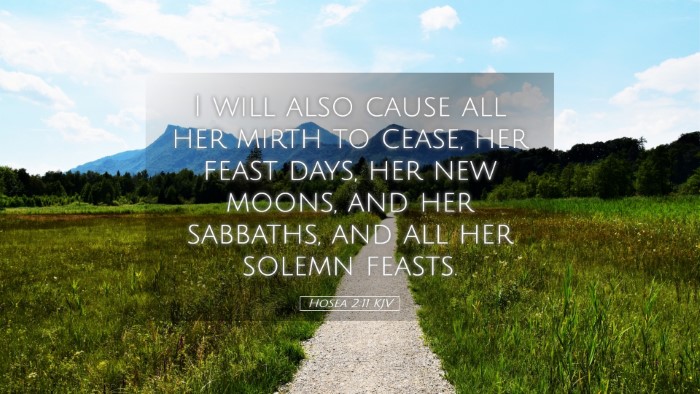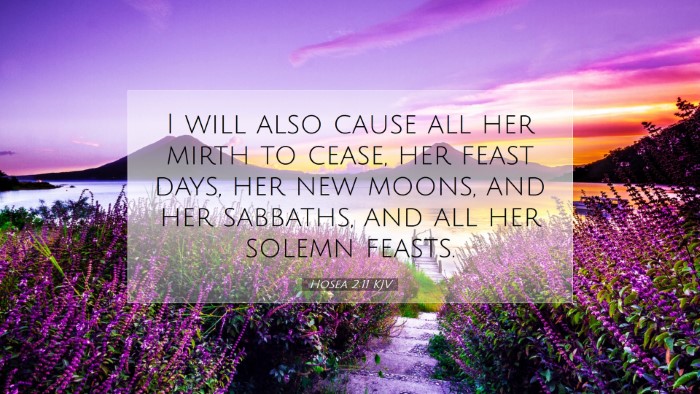Old Testament
Genesis Exodus Leviticus Numbers Deuteronomy Joshua Judges Ruth 1 Samuel 2 Samuel 1 Kings 2 Kings 1 Chronicles 2 Chronicles Ezra Nehemiah Esther Job Psalms Proverbs Ecclesiastes Song of Solomon Isaiah Jeremiah Lamentations Ezekiel Daniel Hosea Joel Amos Obadiah Jonah Micah Nahum Habakkuk Zephaniah Haggai Zechariah MalachiHosea 2:11
Hosea 2:11 KJV
I will also cause all her mirth to cease, her feast days, her new moons, and her sabbaths, and all her solemn feasts.
Hosea 2:11 Bible Commentary
Commentary on Hosea 2:11
Hosea 2:11 (KJV): "I will also cause all her mirth to cease, her feast days, her new moons, and her sabbaths, and all her solemn feasts."
Introduction
The Book of Hosea is a profound study in the themes of love, judgment, and restoration. Hosea, a prophet to the northern kingdom of Israel, uses his own tumultuous marriage as a metaphor for Israel's unfaithfulness to God. In Hosea 2:11, God speaks through the prophet about a time when He will bring desolation upon Israel as a consequence of their idolatry and spiritual infidelity. This verse serves as a turning point, indicating how the loss of joy and ceremonial observances reflects the deeper spiritual barrenness that comes from turning away from God.
The Prophetic Context
Matthew Henry emphasizes that this verse follows the previous depiction of Israel's unfaithfulness. The "mirth" here symbolizes the joy associated with spiritual and communal celebrations. The cessation of joyful times represents God's judgment that falls upon a nation straying into sin. God's intention is to bring His people to repentance, revealing the consequences of their rebellion.
Divine Displeasure
Albert Barnes highlights that God will cause all forms of joyous celebrations to cease as part of His judgment. Israel's feasts, which were meant to be times of worship and thanksgiving, had devolved into excuses for sinful behavior. This message serves as a warning to both ancient Israel and modern readers that the neglect of true worship invites divine displeasure.
Sabbaths and Solemn Feasts
In traditional Jewish practice, the sabbath and annual feasts (like Passover and Yom Kippur) are vital for maintaining the covenant relationship with God. Adam Clarke elucidates that the sabbath is intended not just for rest but for sanctification and worship. The mention of “new moons” and “solemn feasts” indicates the full spectrum of ceremonial life that would be cast into barrenness because of idolatry. The cessation of these observances signifies the withdrawal of God's blessing and presence.
Theological Implications
This verse illustrates significant theological themes that extend beyond the historical context of Israel. It provides a model for understanding God's relationship with His people and the serious consequences of idolatry.
Joy Interwoven with Worship
The grief in this verse reflects a loss of true, God-centered joy. According to Matthew Henry, when we depart from God, we forsake the source of our joy. This truth carries a universal significance; joy apart from God is fleeting and ultimately leads to despair.
The Role of Corporate Worship
The organized aspects of worship depicted in this passage underline the crucial nature of corporate worship in the lives of believers. Albert Barnes points out that the feast days were not only communal experiences but profound declarations of God’s faithfulness. When these are erased, the community’s identity suffers a severe blow.
Contemporary Application
This ancient text resonates with contemporary audiences, reminding us of the importance of aligning our celebrations and worship with God’s will. It serves as a caution against complacency and the ever-present temptation to allow the world to redefine our understanding of joy and celebration.
Recognition of Spiritual Drought
As modern believers reflect on this scripture, there is an invitation to assess our spiritual landscapes. Are we substituting genuine worship with empty rituals or cultural celebrations? Adam Clarke asserts that the absence of true joy in our lives may indicate a distancing from God that needs to be addressed through repentance and return to sincere worship.
The Path to Restoration
Despite the darkness illustrated in Hosea 2:11, it is essential to recognize the broader narrative of Hosea which ultimately leads to hope and restoration. Matthew Henry notes that while judgment is a theme, God's commitment to His people guarantees that judgment is for correction, not destruction. The overarching desire of God is to bring His people back into a joyous communion with Him.
Conclusion
Hosea 2:11 stands as a powerful reminder of the seriousness of spiritual fidelity. By exploring the insights from the commentaries of Matthew Henry, Albert Barnes, and Adam Clarke, it becomes clear that the cessation of joy and ceremonial observance symbolizes a spiritual barrenness that God desires to heal. As we delve deeper into this profound text, let us search our hearts and communities for ways we may return to God, fostering genuine worship that restores our joy and strengthens our faith.


